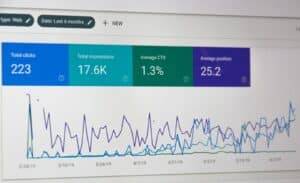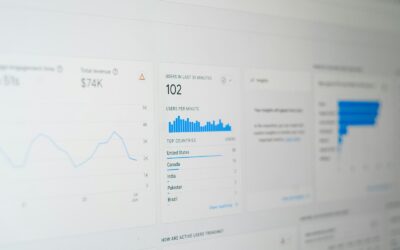Do you know what a SERP API is?
In today's digital age, visibility on major search engines can make or break the success of a business. For small business owners, standing out in search engine results pages (SERPs) is crucial to attracting customers and driving growth.
Enter the SERP API—an innovative tool that can transform your online presence. This guide will walk you through understanding and integrating a SERP API, its benefits, and how it can enhance and support your SEO strategy.

Understanding the Importance of SERPs to Major Search Engines
Search Engine Results Pages (SERPs) are the gateway to online visibility and scale. When potential customers search for products or services, the results displayed on the first page are typically those they engage with
If your business isn't on that first page, you're missing out on valuable traffic. This is where understanding and leveraging SERP data becomes essential.

Understanding How SERP Rankings Work
To effectively improve your small business's visibility online, it is essential to grasp the fundamentals of how SERP rankings are determined.
Looking for an experienced Wordpress Development company?
Search engines like Google utilize complex algorithms that assess various factors to determine a website's relevance and authority in relation to specific search queries.
Understanding these factors, such as keyword usage, content quality, backlinks, and user experience, will enable you to tailor your website accordingly. By navigating the dynamics of SERP rankings, you can enhance your online presence and attract more potential customers to your business.
The Role of Keywords and Their Optimization in Search Engine Results
Keywords are the backbone of SEO and SERP rankings. When users type queries into search engines, they use specific words or phrases—these are keywords.
Search engines then scour the internet for content that matches these keywords. By optimizing your content for relevant keywords, you increase the chances of your website appearing in search results.
Utilizing tools like Google Keyword Planner and SEMrush can help you identify high-value keywords specific to your industry. Include these keywords naturally in your meta titles, descriptions, headers, and throughout your content to improve visibility.
Importance of High-Quality Content
Content is king when it comes to SERP rankings. High-quality content not only engages your audience but also signals to search engines that your site is credible and valuable. Google, for instance, uses algorithms to evaluate the relevance and quality of your content.
Strive to create informative, engaging, and original content that addresses the needs and questions of your audience. This can include blog posts, articles, videos, and infographics. The goal is to provide value, which in turn will keep visitors on your site longer—a key factor in SERP rankings.
The Significance of Backlinks
Backlinks are essentially votes of confidence from other websites. They indicate to search engines that your content is trustworthy and authoritative. The more high-quality backlinks you have, the better your site will rank.
Focus on acquiring backlinks from reputable sites within your industry. You can do this through guest posting, partnerships, or simply by creating content that others naturally want to link to. Tools like Moz and Ahrefs can help you track and manage your backlinks effectively.
User Experience on Your Website
User experience (UX) is crucial for both retaining visitors and improving SERP rankings. Search engines consider factors like page load time, mobile-friendliness, and easy navigation when ranking sites.
Ensure your website loads quickly, is mobile-responsive, and offers a seamless navigation experience. Implementing these changes can significantly enhance user satisfaction and improve your SERP rankings.

Practical Strategies for Improving SERP Rankings
Having a solid understanding of how SERP rankings work lays the foundation for developing effective strategies to enhance your online visibility.
In this section, we will provide a comprehensive overview of practical approaches that small business owners can implement to improve their SERP rankings. From leveraging the power of social media to refining your website's technical aspects, these actionable strategies aim to boost your search engine presence and drive more traffic to your site.
By focusing on these key areas, you will not only attract more visitors but also increase your chances of converting them into loyal customers.
Conducting Effective Keyword Research
Effective keyword research is the first step in any successful SEO strategy. Utilize tools like Google Keyword Planner and SEMrush to identify keywords with high search volumes and low competition. These keywords should be relevant to your business and the services you offer.
Once you've identified your target keywords, integrate them naturally into your content, meta titles, and descriptions. Avoid keyword stuffing, as it can lead to penalties from search engines.
Creating High-Quality, Engaging Content
High-quality content is pivotal for attracting and retaining visitors. Create content that addresses the needs and questions of your audience. This could be in the form of how-to guides, tutorials, blog posts, or industry news.
Engage your readers by using a conversational tone, incorporating visuals, and breaking up text with headings and bullet points. High engagement rates signal to search engines that your content is valuable, thereby improving your SERP rankings.
Building Quality Backlinks
Acquiring high-quality backlinks from reputable sites within your industry can significantly boost your SERP rankings. Reach out to industry leaders, write guest posts, and participate in forums to build your backlink profile.
Use tools like Moz and Ahrefs to track your backlinks and identify new opportunities for link-building. Remember, quality over quantity is the key when it comes to backlinks.
Enhancing Website User Experience
A positive user experience is essential for both retaining visitors and improving SERP rankings. Ensure your website is mobile-friendly, loads quickly, and is easy to navigate. Use tools like Google PageSpeed Insights to identify areas for improvement.
Improving UX not only enhances visitor satisfaction but also signals to search engines that your site is valuable and user-friendly, thereby boosting your rankings.

The Impact of SERP Rankings on Small Businesses
SERP rankings can significantly influence the success of small businesses in today's digital landscape. With an increasing number of consumers relying on search engines to find products and services, achieving a higher ranking can mean the difference between being discovered or overlooked.
As small businesses often operate with limited budgets, leveraging effective SEO strategies to enhance their visibility is crucial for attracting potential customers.
In this section, we will explore how SERP rankings affect small business growth, customer engagement, and overall online presence, highlighting the importance of prioritizing SEO efforts in a competitive market.
Case Studies and Examples of Success Stories
Numerous small businesses have achieved significant growth by improving their SERP rankings.
Take, for instance, a local bakery that saw a 200% increase in online orders after optimizing its website for local SEO. By targeting keywords like “best bakery in [City]” and acquiring backlinks from local food blogs, they climbed to the top of search results.
Another example is a boutique clothing store that increased foot traffic by 150% after enhancing its online presence. By focusing on high-quality content and user experience, they attracted more visitors both online and offline.
Measuring and Tracking Your SERP Performance
It's essential to measure and track your SERP performance to understand what's working and what needs improvement.
Tools like Google Analytics and Google Search Console provide valuable insights into your site's performance, including traffic sources, keyword rankings, and user behavior.
Regularly review these metrics to identify trends, track progress, and make data-driven decisions to enhance your SEO strategy. This ongoing analysis will help you stay ahead of the competition and continually improve your SERP rankings.

What is a SERP API?
A SERP API (Search Engine Results Page Application Programming Interface) is code that allows businesses to query search engines and retrieve structured data about search results.
This data includes information on keywords, rankings, snippets, and more. Essentially, a SERP API provides a comprehensive view of how your business appears online.
How Does SERP API Work?
A SERP API sends a request to search engines like Google, Bing, or Yahoo, and retrieves relevant search results data.
This data is then delivered in a structured format, such as JSON or XML, making it easy to analyze and integrate into various applications. Businesses can use this data to monitor their rankings, analyze competitors, and optimize their content.
Benefits for Businesses
Using a SERP API offers several advantages:
- Accurate Data Retrieval: Obtain precise and up-to-date information about your search rankings.
- Time Efficiency: Automate the process of gathering search data, saving time and resources.
- Competitive Analysis: Gain insights into your competitors' performance and strategies.
- SEO Optimization: Use detailed search data to refine your SEO efforts and improve rankings.
What is a SERP Scraper API, and Is It the Same as a SERP API?
A SERP Scraper API is a specific type of SERP API designed specifically for extracting and organizing search engine results.
While both types of APIs facilitate the acquisition of search data, a SERP Scraper API is typically focused on gathering content directly from search engine results pages, including organic listings, paid ads, local packs, links, and featured snippets. This service allows businesses and developers to scrape the data in a manner that can be effortlessly processed and analyzed.
Although a SERP API and a SERP Scraper API share similar functionalities in retrieving search engine data, they may differ in scope and application.
A standard SERP API may provide broader access to structured data points and insights that encompass not just the results of search requests themselves but also other relevant metrics and analytics.
In contrast, a SERP Scraper API is often used for more intensive data extraction and detailed analysis of specific search results without as much emphasis on the broader context. Understanding these nuanced differences is essential for businesses to select the right tool that aligns with their specific data needs and objectives in the realm of search engine optimization.

Integrating SERP API into Your Business
Integrating a SERP API into your business operations might sound daunting, but it's a straightforward process.
Here's a step-by-step guide to help you get started:
Step 1: Choose the Right SERP API Provider
Start by selecting a reliable SERP API provider. Look for features such as accuracy, response time, and ease of integration. Popular options include SEMrush, Ahrefs, and Moz.
Step 2: Get Your API Key
Once you've chosen a provider, sign up and obtain your API key. This key is essential for making requests to the API and retrieving data.
Step 3: Set Up API Requests
Use the API key to set up HTTP requests to the SERP API. You can customize these requests based on parameters such as keywords, title, location, language, and device type. For example, if you're a coffee shop owner, you might want to track keywords like “best coffee shop in [your city].”
Step 4: Analyze the Data
After retrieving the data, analyze it to gain insights. Look at rankings, featured snippets, and competitor searches and performance. Use this information to adjust your SEO strategy and improve your search engine visibility.
Step 5: Implement Changes
Based on your analysis, make the necessary changes to your website and content. This might involve optimizing keywords, improving meta descriptions and images, or enhancing on-page SEO elements.
Real-World Examples
Let's look at how different industries can benefit from integrating a SERP API:
- Coffee Shops: Track local search terms to attract customers looking for the best coffee spots.
- Local Businesses: Monitor rankings for location-based keywords to increase foot traffic and online orders.
- E-commerce Stores: Analyze product-related keywords to improve product listings and drive sales.
Enhancing SEO with SERP API
A SERP API is a powerful tool for enhancing your SEO strategy. Here's how you can use it effectively:
Market Research
Use SERP data to understand market trends and customer behavior. Identify popular keywords and search queries related to your industry.
For example, if you run a pizza restaurant, track search terms for restaurants like “best pizza in [your city].” This information can guide your marketing efforts and help you create content that resonates with your audience.
Competitor Analysis
Analyze your competitors' search performance to identify their strengths and weaknesses.
Look at the keywords they rank for, their backlink profiles, and their content strategies. Use this data to develop a competitive edge and improve your own rankings.
Rank Tracking
Monitor your search rankings over time to measure the impact of your SEO efforts. Use the SERP API to track changes in your rankings for specific keywords. This allows you to identify what works and what doesn't, enabling you to refine your strategy continuously.

Features and Best Practices
SERP APIs come with a variety of features that can enhance your SEO efforts.
Here are some key features to look for and best practices to follow:
Key Features
- Keyword Tracking: Monitor the performance of specific keywords.
- Local Search: Track rankings based on location to target local customers.
- Mobile Search: Analyze search results on mobile devices to optimize for mobile users.
- SERP Features: Identify featured snippets, knowledge panels, and other SERP features that can impact your visibility.
Best Practices
- Set Clear Goals: Define what you want to achieve with the SERP API. Are you looking to improve rankings, increase traffic, or analyze competitors?
- Customize Search Parameters: Tailor your API requests to match your business needs. Focus on relevant keywords, locations, and devices.
- Regular Monitoring: Continuously monitor your search performance and make adjustments as needed.
- Data Interpretation: Learn how to interpret SERP data effectively. Understand what the data tells you about your search performance and how you can use it to your advantage.

Best SERP API Monitoring Tools
When it comes to tracking your SEO performance and gaining insights from SERP data, several tools stand out for their unique features and capabilities. Here are some of the best SERP API monitoring tools available:
- Position Tracking: Part of SEMrush, this tool allows you to track keyword positions over time, providing insights into visibility and traffic predictions.
- SEMrush Sensor: Offers insights into SERP volatility, helping you track changes in ranking positions and market trends.
- AccuRanker: Known for its fast and reliable rank tracking, it provides daily updates and allows you to segment data by various metrics.
- SERPWatch: A user-friendly tracking tool that provides comprehensive reports on keyword rankings and competitor analysis.
- SE Ranking: This all-in-one SEO tool includes rank tracking, competitor research, and website audits, making it versatile for any SEO strategy.
- Pro Rank Tracker: Allows advanced reporting options and tracking for both local and international rankings.
- Advanced Web Ranking: A robust rank-tracking tool that offers white-label reporting and powerful SEO insights.
- WhatsMySerp: A straightforward tool for tracking SERP positions and gathering data about your site's performance.
- SpySERP: Focuses on competitor rankings, providing insights that can help sharpen your SEO strategies.
- SERPAPI: An API solution designed to retrieve real-time search results from Google, Yahoo, and Bing with ease.
- Ahrefs API: While primarily an SEO analysis tool, its API offers valuable data on keyword rankings and backlink profiles.
- Google Analytics: A powerful tool for tracking and reporting website traffic, Google Analytics provides insights into user behavior, allowing you to measure the effectiveness of your SEO strategies and optimize your content accordingly.
- Google Search Console: This free service helps you monitor, maintain, and troubleshoot your site's presence in Google search results. It provides valuable data on search queries, clicks, impressions, and site errors, helping you to improve your SEO performance and visibility.
These tools can help you effectively monitor your SEO performance, uncover opportunities for enhancement, and keep you competitive in your industry.

SERP API | The Innovative and Effective Solution for Bettering Your Google Search Results
Integrating a SERP API into your business operations can significantly enhance your online visibility and SEO strategy. By providing accurate search data, enabling competitive analysis, and offering insights into market trends, a SERP API is a valuable tool for small business owners. Whether you're running a coffee shop, a local business, or an e-commerce store, leveraging SERP data can help you attract more customers and grow your business.
Ready to take your SEO efforts to the next level? Get in touch with us at Priceless Consulting for personalized advice on your search strategy. Our team of experts is here to help you integrate SERP API into leading search engines and achieve your business goals. Explore the possibilities of SERP API today and dominate the search results!
For more insights and tips on SEO and digital marketing, check out our other posts on SEO Best Practices, Digital Marketing Strategies, and Local SEO Strategies.







